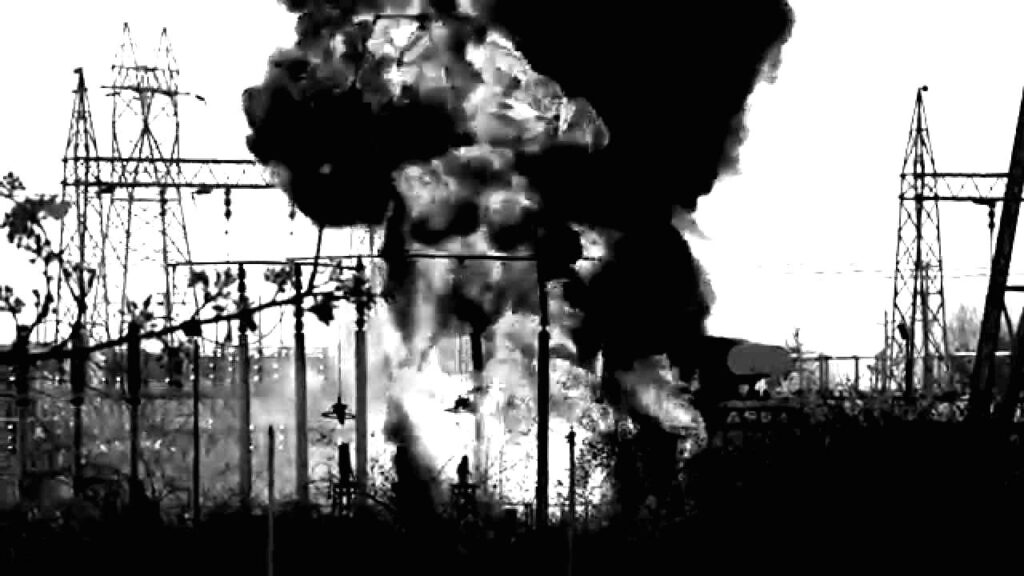collected writings 2023
CivilizationsHostageSituation-print
Santiago, Chile: Arson attack against telecommunications antenna
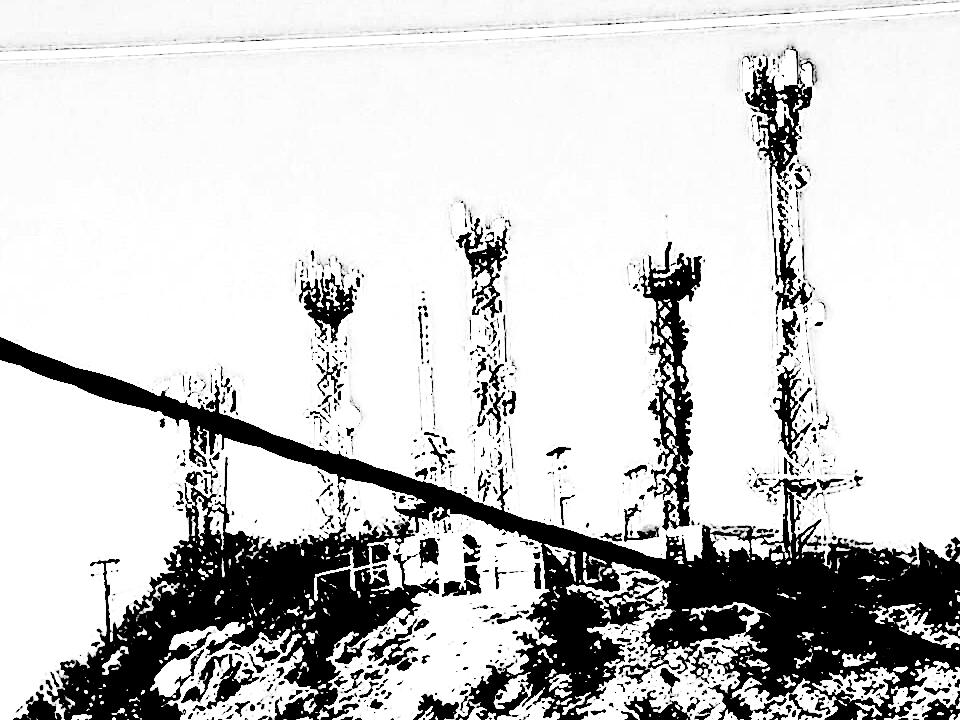
Posted on 2022/06/13 by darknights.noblogs.org
Attack carried out on the night of Sunday, June 5, 2022.
“Certain human cultures have been waging war against the Earth for millennia. I chose to fight on the side of bears, mountain lions, skunks, bats, saguaros, cliff roses and all things wild.”
Bill Rodgers.(Avalon), ELF member
It has been 13 years since our comrade Mauricio Morales, the punky, left his earthly life in the midst of the offensive that with courage and will he raised against the tortured bastards of the gendarmerie school. Unfortunately, the explosive device he was carrying started earlier than expected, generating the consequences already known by many. We embrace punky and his actions from the depths of our irreducible spirit, meeting him on different fronts: against prisons, capital, speciesism and civilization.
It is in this last front, responding to the call to raise the memory of punky in this Black May, is that we have decided to attack a telecommunications antenna of the Entel company, located on a hill in the commune of Puente Alto, in the capital of the territory dominated by the Chilean state. We are and will always be against the advance of technology and the digitalization of our lives. The existence of these means the exploitation and devastation of the ñuke mapu, the extraction of its minerals through the genocide of wild species in pursuit of the filthy commodities needed by the warriors to reproduce their cursed existence. Antennas like this one erode their natural environment, both at the time of their installation, as well as in the recurrent maintenance they require. Moreover, the effects on the different beings produced by a world overloaded with electromagnetic waves through these antennas and new technologies such as the 5G network are doubtful. We are not scientists nor do we pretend to prove that they do harm, but the invitation of our instinct to destroy them is enough for us.
We know the winkul, we are not alien and we will never be alien to the wild and free life that lives there. We identify with the insects, the earth, the plants, the animals, the birds. We set out to fly like them and direct our sights to the target. We attack without hesitation, claiming with dignity the destruction and sabotage against the power, its authorities and the gear of domination that spreads thanks to the murderous civilizing progress. We studied the place, we understand the risks of actions in nature, so we made sure that the necessary firewalls were in place so as not to affect wildlife. And so it was, in an act of consistency and thanks to a timed incendiary device, all the electrical connections of the antenna were destroyed by the restless fire of our free piukes. The company is still unable to resume operations in the sector, which fills us with joy.
Our proposal is the proliferation of all actions for total liberation, defending and conserving the Earth, rivers, lakes, seas, hills, forests and all beings that live in balance, through autonomy and weichan. We do not allow ourselves to be deceived by these legalistic-reformist-democratic times, lukewarm without spirit, waiting for the moral sense of the exploiters of the Earth. We call on the sisters and brothers of the pikun mapu to take a stand and to let their imagination fly to defend the foothills and the island hills of this part of the territory that still resist the onslaught of the prison-civilizing-capitalist society. All action is possible with study, organization, daring, courage, will and self-care. May our patience not be passive, but the correct planning of the offensive.
We make an accomplice salute to all the active cells and street actions that have raised the memory these months, strong and proud we feel dialoguing in action.
We also echo the call for the release of Marcelo Villarroel, we also act in solidarity and against the convictions of the nefarious military justice.
We salute all long-sentenced anarchist prisoners.
Freedom for Marcelo, Juan, Mónica, Francisco and Joaquín!
Freedom for Mayo, Kuyi, Jalea and all the comrades kidnapped by the state in the last few weeks!
Comrades Luisa Toledo, Santiago Maldonado, Emilia Baucis, Pelao Angry present!!!
“Because when in your heart freedom, love and anarchy accompany your heartbeat: Anarchy does not die in the mouth, it prevails in active hands.”
Punky Mauri.
Céula Anárkika Boske Black
Lachapelle-sous-Aubenas (Ardèche), France: Sabotage of an electrical station, “the fairies will never be electric”
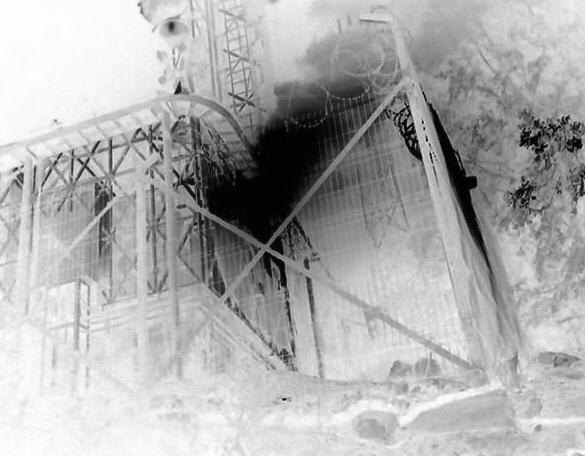
22/9/2021 actforfree.noblogs.org
Don’t forget to turn off the light on your way out
The modern world has held us hostage non stop, ever since childhood, venting the merits of security and making us forget the copious dose of servitude we must accept in return for progress through a series of increasingly poorly kept promises.
As the horizons that present themselves at the forefront of civilization’s advances continue to darken – the ravaging of wilderness, the increasing domestication of the living, the artificialization of beings – the present world continues its frantic race, making it ever more dependent on energy infrastructures and the products they consume and produce: oil, uranium, electricity.
In the space of less than two centuries, the production of electricity and the increasing electrification of spaces has continued to expand and colonize every part of our lives.
Initially, only a few businesses and industries used electric energy. Then the technique gradually spread to domestic use. Today, we carry and use more and more accessories in our daily lives at every moment, in our pockets or on our wrists, and they give rhythm to the slightest moment of our existence to the point of their use being completely normalized.
What is clear is that a technique that was once marginal and reserved for a few industries has taken on an exponential and diffuse dimension, imposing its reign in the span of a few generations.
If getting out of the digital web seems an increasingly complex challenge to realize, trying to escape from a world in which all relationships are subject to electricity is even more so.
What is now apparent is that as society becomes more dependent on electricity, it is in danger of not being able to sustain its organizational existence without it. It took these same few generations to lose the use and knowledge of a set of acts and practices, once again accelerating the reign of dependency. Beyond comfort, what the electric world builds in us above all is an experience of the dispossession of our choices and autonomy. Most of the life experiences that we can have often take place within an increasingly normalized reality.
Electrical infrastructure is then revealed as the cornerstone of what, under the guise of a world of progress and emancipation, turns out to be a totalitarian and murderous system that often forces us, willingly or not, to move forward in the direction of its development.
If, through our act of sabotage, we attacked an important electrical transformer in the Aubenas basin during the night of 13 July 2021, it is because we wanted to direct our rage against the whole of what the electrical system embodies and represents. At the same time, we wanted to remove ourselves from the ideological blackmail that the march of the techno-industrial world is subjecting us to.
In order to be heard by the greatest number of people, the critique of the current world often refuses to radically upset the conditions of existence.
It is said that, from the confines of your domestic space, it is possible to put a certain use of electricity in question, resort to given processes to gain autonomy and self-sufficiency from a certain point of view.
As it has become so complicated for the majority to imagine a world without electricity, “acts of resistance” are transformed in a technical way, in the image of the world by which they are produced. Rather than question techno-scientific domination as a whole, we will be seduced by the illusory possibility of reappropriating bits and pieces of a world that, for a long time, has no longer been thought of on the scale of our needs but responds above all to the rise of the reign of machines.
The Revolution of small daily gestures will not take place. In any case, from now on it is acclaimed by domination and takes the form of a smokescreen distilling the illusion of action. This so-called Revolution seems to us a fundamental renunciation, the loss of our ability to imagine a radically different world in which norms would no longer be dictated by the scientific and industrial imagination. We wish to continue to desire and envisage a world in which technical progress would no longer be the only positive narrative shaping the future.
If we believe in individual possibilities, we think it is a pity that they have to be pacified by overvaluing small daily gestures, turning the choice of an eco-friendly soap or a timed shower in a modern flat into a subversive practice. The choice of turning on or off the light is increasingly like false electoral possibilities, as if the criticism of the present world could only be made within an imposed framework (electoral system, digital infrastructure…).
Today, whoever knowingly attacks what is connected to the indispensable flows of the contemporary world is systematically considered the hostage-taker of many human lives.
It seems curious that contemporary Western morality, while it has never ceased to build itself on a series of mass murders and individual enslavements (slavery, colonization), while it has treated entire populations as nuclear guinea pigs (Polynesia, Algeria,… ), while it organizes servitude for the majority of people, barely disguised by consumption, while it knows without flinching that its entire standard of living is the fruit of the enslavement of living beings and other out of sight humans, treats as terrorists any individuals who would question the general level of dependency on infrastructures and untouchable flows that are supported by most people.
By attacking the electricity infrastructure directly we want to pierce the abscess of blackmail that this world is forcing upon us. To hear the technocrats: anyone wanting to go against the modern, benevolent world is attacking the weakest and most dependent of the system.
We are tired of delegating our strength, our capabilities and our security to a world that locks us in, maintains our dependence and often organizes our weakening.
Contrary to everything they might say, progress is not a philanthropic project.
In the age of capitalism, technical advances are above all commercial projects. The ultimate goal is not and never has been to make some people happy or contribute to the comfort of others. In this mirage in which we live, everything is maintained to make the rules of the economy and the State invisible. It is easier to accept hell when it is paved with good intentions.
We are currently deprived of exploring other possibilities of existence by the construction of infrastructures that are increasingly chaining us to a murderous societal project. When everything and everyone is caught and held by the same dominant reality, it is no longer possible to oppose it without directly opposing the whole system and its infrastructures.
While it seems important to disconnect individually, the very nature of the interconnected grid makes individual disconnection an incomplete and insufficient act.
Attacking the infrastructure is a much greater guarantee that the electric world will stop capturing us and imposing its reign of speed.
To unplug this electric world is to reveal the extent of what it affects and governs.
To unplug this electric world is to acknowledge that it is increasingly difficult to act and think for ourselves beyond its grip and that it is becoming increasingly important to do so.
Unplugging this electrical world is an attempt to create a chain reaction, affecting all the infrastructures and things that function thanks to electricity (digital, communication, banking, state, industry and business networks, military and police infrastructures, etc.).
Disconnecting this electrical world means attacking the myth of clean energy that lies behind nuclear power.
To unplug this electric world is to take a step into the unknown.
During the night, at a very late hour, we entered an electric depot on the outskirts of the town of La Chappelle Sous Aubenas in Ardèche. After cutting a large hole in the fence, we sneaked into the infrastructure to attack it at various points.
Several fires were started inside buildings that we had opened previously. These buildings contained generators and backup batteries that we suspect would take over if the rest of the infrastructure were damaged.
We also set fire to several electrical meters around and in the central building, which we believed housed a gigantic converter.
Finally, after lifting two separate metal plates, we set fire to some electric cables snaking between the various installations on the site.
In all, 9 fires were illuminating the night when we escaped.
As far as we could see, the towns and villages around the act were not plunged into darkness. Despite what we imagine to have been significant damage, with several well established fires at the site, the rest of the power grid did not appear to have been touched by the damage we caused.
This has not discouraged us from wanting to keep on attacking the electrical society.
We greet the authors of the Toulouse communique for the attack on an electric transformer. The words of the text touched our hearts and our minds.
Courage to those who resist in the present against the destruction of life and freedom.
A special thought for the comrade Boris, still in coma.
More than ever, in these nauseating times, we prefer the risk of the situation going off the rails to the false peace of deadly comfort.
Better the darkness of a night without neon lights than the brightness of a path into the abyss.
For magic to return to our lives. Because the fairies will never be electric.
PS: Don’t forget to turn off the light on your way out!
Ramonville-Saint-Agne (Haute-Garonne) France : Turning off the civilized light
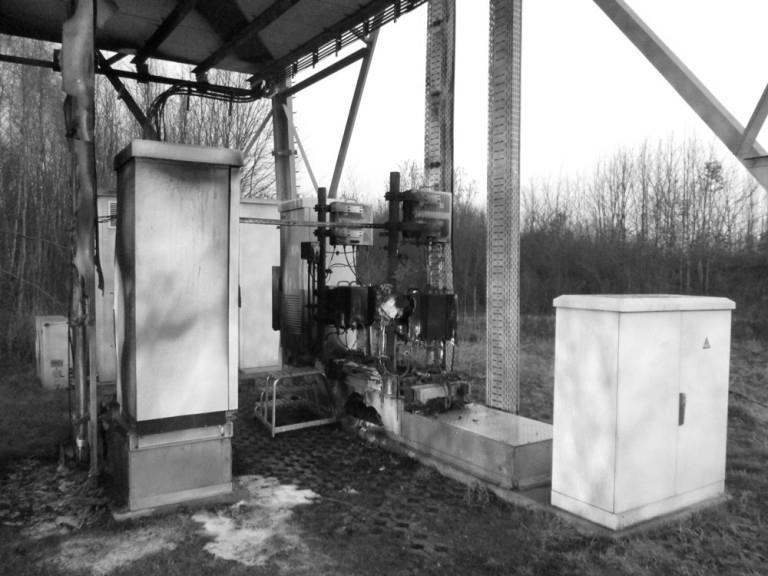
28/06/2021 actforfree.noblogs.org
At the beginning of June, we attacked the Lespinet electrical substation (63kV) in Ramonville-Saint-Agne.
We chose this small transformer station because we had to start somewhere. Because these structures are sensitive nodes of the electrical network. Because electricity appears to us today as the blood of civilization. Because we are prisoners of the human empire. So much so that even when we try to escape by contemplating the stars, satellites chase us. Because it blinds us, and we want to extinguish the civilized light.
A plunge into the unknown. When we entered the enclosure, we wondered if we would die electrocuted. But nothing happened, even 2-3 meters from the transformers. When we set fire to the transformers, we wondered if we were going to reduce this station to ashes and plunge a part of the city into darkness. If there would be an explosion, if the surrounding factories would stop, if the streetlights around us would go out. But that didn’t happen either.
The installation is still working, only one transformer out of 3 is a little blackened by the flames and we don’t know if it is out of order.
Under the transformers, at the level of the fans, we placed 2 tires filled with cloth soaked in gasoline. We don’t know why it didn’t work: maybe a quick intervention of the firemen, an insufficient quantity of material to burn or a bad method more generally.
This is a bit of a disappointment, but it was exciting to overcome our fears for one night and watch the flames dance.
A knowing nod to those who are attacking the march of progress, to those who have fallen for it and to those who are thinking of taking the plunge.
Aubenas: Full Moon /Black Out: first attempt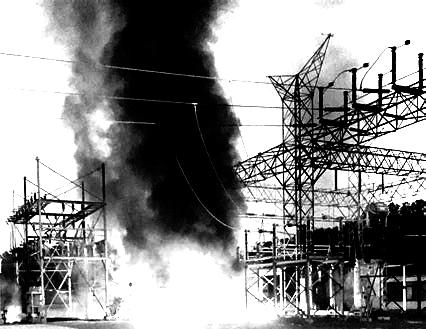
29/06/2020 attaque.noblogs.org
Claim for an incendiary attack on an electricity transformer
At times there are doubts among us. Some have few. Others none.
Could we face the consequences of a large scale black out? The dead, the chaos it would cause? Would we ourselves be able to survive such a transformation of the world? Perhaps not.
But leaving the world as it is, is even more unbearable, submitting to the blackmail that it would be even worse if the human and technological institutions were not there to manage our lives on our behalf, rather than accept taking risks by acting.
It is not a question of silencing all doubts. It is a question of being able to act anyway. Understanding that if our actions have any impact, if they undoubtedly cause some harm to beings we didn’t target, our passivity is just as murderous.
The so-much-spoken-of hospitals, cement anthills where devastated bodies and good intentions pile up that need to be protected at all costs because they make it possible «to save lives», need electricity supply and other raw materials in order to function, which definitely kill.
The technological peace drip-fed to the masses is a lie. The connected world is built on a mass grave and feeds on the dead and destruction. And the beautiful images of tablets in schools and care homes won’t change anything. The aperitifs on Skype taste of blood. The doubts we might have are traces of the humanist and State masquerade telling us that the system is indispensable to us. That everything carries on in the best way in the best possible world, and that it would be irresponsible for a few individuals to act selfishly by harming what belongs to all. This is not the time for a debate on selfishness. Our desire is to smash the myth according to which letting things continue has no consequences. What is common to all doesn’t interest us in the least, but it should be pointed out that it is limited to a certain part of the human population, without touching all the beings that live on this big stone we call Earth, of course.
For us it will always be preferable to act with possible doubts rather than let the latter feed a sense of impotence.
Because out of our impotence our death will come, and what we want more than anything is to live. To live by returning the blows we receive. To live without the human and technological mediation that is imposing itself between us and the rest of the world. And when we become aware of being conditioned, when we think of all the horror the world generates, our doubts matter little.
We attacked the electricity network because today, without it, this civilization would collapse. We don’t desire to return to some time in the past. We have no illusions about the fact that some civilizations were built without electricity. All we know is that this one relies on it so much as to be unable to do without it. And that this is one of its weak points. And even if we are its offspring, and it couldn’t be otherwise, we are struggling to kill the germs it was able to leave in us. We are struggling against our domestication, our submission to norms, our cowardice and our love of security.
But we use some of the instruments it provides us with. Because it is no longer possible for rebels to communicate by smoke signals, and we are still interested in putting words to our actions, which can reach those who wish to read them, and can also be a considerable component of our attacks against docility, the people who create it and those who defend it. The acts of destruction around us in recent times are many.
Thank you brave hands that refuse to be confined in times when even part of the «radical» movement want to see us shut at home because it is more important to be «safe» than to try to be free.
Thank you to those for whom writing means something because it is necessary to share our thoughts so that our acts resound with the intentions that animate us. Because the fact of reading texts calling for attack, sharp analyses and claims plays a part in modeling our ideas, conceiving new strategies of attack. Besides, that is the reason for wanting to inscribe our attack in the call to conflict launched by the text «In May do what you like: a call to conflict», whose numerous questions we have made our own, to which, with our attack, we wanted to give some elements of response. Because, whatever you say about it, these texts come out of the dematerialized horror of the Internet to nourish debates, reflections and give strength to the living.
Attempts are made, sometimes without even knowing exactly what one will come up against. The only thing we do know is that through our acts things won’t remain intact.
We chose to attack an electricity transformer without knowing what damage we would cause, but hoping for beautiful electric arcs, a lot of smoke and fewer lights to give space to the full moon. We need nothing else to brighten us up and artificial lights are an offence to the beauty of the night.
As we were approaching the site, in the Aubenas area, we carried with us the imaginary memory of all the tormented souls who have rebelled against the civilizations that tried to destroy their wild lives. We set fire to six spots, mainly on cables assembled beneath cement slabs, noisy but easy to lift. We took care not to touch metal structures and apart from some slight discomfort, a buzzing sensation in the head, nothing serious happened to us as we walked around the terminal point of three high voltage lines. As we were leaving the site, our bodies tensed with adrenaline and smiles under our scarfs, the fires had caught well.
Unfortunately the artificial lights surrounding us didn’t go out. We will probably never know what damage was done to the electricity network because the media didn’t mention it. One more reason for us to do it ourselves, so as not to give them the opportunity to silence our efforts. Presumably, neither the city nor the surrounding valleys suffered much damage. Too bad! We tried. The only real way to know where it is good to attack is to try everywhere. We have no doubts about the fact that there will be further attempts.
Our hearts are burning with the desire to extinguish the monster-machine once and for all. Because hatred and disgust for the civilized human mass seep through all the pores of our skin. Because only lights we like at night are those of flames and reflections of the moon.
Des Rejetons du Désastre. / Offspring of Disaster
The impacts of an attack on the electrical grid
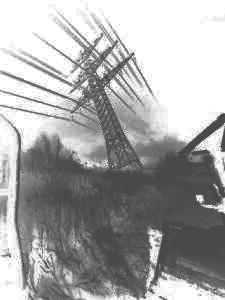
2020/06/23 warriorup.noblogs.org
“Any terrorist group that would like to bring a country to its knees has the means to do so. “
Grégoire Chambaz, Captain of the Swiss Army, on the attacks on the electrical network
What do airports, water treatment facilities, gas stations and espresso machines have in common? A dependence on a reliable and stable power generation and distribution system. Around the world, our power grids are aging, overstretched, and increasingly vulnerable to attack. The increased centralization and interdependence of these grids means that the risk of large-scale failure has never been greater. The next time the lights go out, they may never come on again.
First of all, let’s imagine what would happen in the event of a widespread power outage (a blackout). First, the lights, projectors and computers go out. You can’t work or study, so you try to get out. It turns out that most of the automatic doors and gates don’t work anymore, but finally you manage to get back to the street.
You may want to eat something. However, you have several problems. First, if you don’t have any change, you can’t buy anything, because the credit card needs the network to work. After a few hours, all the food that was frozen in restaurants and supermarkets has to be consumed or thrown away, which leads to huge losses. Finally, most of the cooking plates being electric, you probably have to take out your camping stove to be able to cook.
Of course, planes are immediately grounded due to lack of air traffic control. Trains and public transport (streetcar, metro) run on electricity, they are also at a standstill. Land traffic is hindered, as traffic lights are turned off, causing accidents and slowdowns. However, this does not last very long: the gas pumps also work with electricity. Soon, the roads are empty.
The exchange of money ceases, the stock market stops immediately. Without computers, without communication, without transportation, most economic activities come to a halt.
You follow all this information carefully. Then your phones, base stations and transmitters run out of power. From then on, news reaches you only sporadically. Decision-makers are also sailing blind: without centralized control or communication instruments, they are quite powerless.
Blackout: a super-risk
As you can see, electricity is critical. It is necessary for all aspects of our activity, and we no longer know how to live without it. Here is what Grégoire Chambaz explains:
What makes the risk of a blackout so unique? First of all, it is a risk directly linked to a critical sector, which is not the case for a pandemic or an economic crisis. This critical sector is the supply of electricity. Without electricity, our societies could not function. If they can afford to go without oil for a few days, a power outage affects them immediately.
How is this possible? For two main reasons. The first is that electricity drives all other critical sectors and infrastructures. They are virtually unable to function without it. The second reason is that the blackout paralyzes the two most important critical sectors after electricity, namely telecommunications and information systems. Without them, coordination becomes very difficult, especially during a crisis situation like a power outage. This centrality of electricity was highlighted in 2010 in a report by the Federal Office for Civil Protection (FOCP) on the criticality of critical sectors. The FOCP defines criticality as “the relative importance of a critical sector in terms of the effects that its shutdown or destruction would have on the economy and the population”.
Within this framework, the report makes a qualitative assessment (on four levels: 0, 1, 2, 3) of the importance of each critical sector in relation to the others. The results show the centrality of electricity supply, affecting more sectors than any other and causing the most impact on the whole (see table below). Information systems and telecommunications come second and third respectively. Conversely, the sectors most vulnerable to the shutdown of others are emergency services and hospitals. Consequently, the criticality of the electricity supply determines the blackout as the most important risk and motivates its qualification as “super-risk”.
“The blackout, a “super-risk”: An explanation by criticality”, G. Chambaz, RMS No 05-2018 (see below)
Network recovery
When the entire power grid has collapsed, does it restart in a matter of moments? Not so simple. It is a very delicate step, because the demand has to be permanently adjusted to the supply, while the consumers just want to use electricity. This reconstruction is done little by little, sector by sector, all without telecommunication. This can take months. If the blackout lasts only one day, the recovery is fast. If it lasts more than 48 hours, the recovery of the network is less likely, if not impossible. All the instruments that control the networks are powered by electricity themselves, they have an autonomy of 2 to 5 days. Once they run out of battery power, they must be restarted in a synchronized way with the rest of the network, always without telecommunication. If the network has not been restored after 5 days, it cannot be restored without outside help. If the blackout is regional, there are emergency and repair services that can be dispatched. If the blackout is national or continental, the situation may persist or even be fatal to the network.
This scenario – catastrophic for some, dreamy for others – seems in any case unrealistic. And yet… This network on which we depend so much is far from being as solid as we might think. This is mainly due to one element: the transformers.
Transformers, central parts of the network
Transformers are found at all levels of the grid. The role of a transformer is simply to change the voltage of the electricity. Some transformers increase the voltage so that it can travel long distances (on “high voltage” lines), others lower it so that it corresponds to the voltage of our sockets. They are therefore necessary to connect the different parts of the network.
There are many, many small, standardized transformers, which are located every 3 to 4 houses. In case of failure, these are easily replaced. And then there are those that go from high to low voltage, which are huge (and aging). These are the ones we are interested in.
These things are monstrous, costing millions of euros, weighing up to 350 tons. They are the size of shipping containers, made entirely of steel and copper (metals that contribute half of the exorbitant price of the equipment). Such equipment takes a long time to manufacture (5 to 20 months), as it is custom-made. Usually only one part is built at a time for each model, so there are no spare parts or interchangeable parts. As a result, repairs are also very time consuming and complex.
Transporting them is also a headache. The most common means of transport is by rail, but only specialized wagons can carry the weight. In France, the STSI carries out this type of transport, and has a total of 10 special wagons. In the United States, there are only 30 cars. If the location is not accessible by rail, the movement is done by road. Specialized semi-trailers, “caterpillars”, with 200 wheels are used. They need authorization to cross any municipality, and the roadway must be modified and power lines moved to allow passage. In short, as you can see, the construction and relocation of the transformers means that they are not easily replaceable.
Criticality of transformers
As we said, transformers are essential to the network. They are installed in what are called substations, surrounded by walls and fencing. Some substations are very critical. When a transformer fails, it can have a cascading effect on the entire network. For example, there are 55,000 substations in the United States. 350 of them are the most critical. Studies by the U.S. government and utilities estimate that as few as 9 substations out of service could bring down the entire U.S. grid for 18 months. Remember the consequences of a 5-day blackout. 18 months would be fatal to the grid.
Transformer protection
Given the criticality of such equipment, one would expect it to be ultra-protected. In reality, the security of the stations is so deficient that it is sometimes comical.
“For us it will always be preferable to act with possible doubts rather than let the latter feed a sense of impotence.
Because out of our impotence our death will come, and what we want more than anything is to live. To live by returning the blows we receive. To live without the human and technological mediation that is imposing itself between us and the rest of the world. And when we become aware of being conditioned, when we think of all the horror the world generates, our doubts matter little.”
“A knowing nod to those who are attacking the march of progress, to those who have fallen for it and to those who are thinking of taking the plunge.”
“We know the winkul, we are not alien and we will never be alien to the wild and free life that lives there. We identify with the insects, the earth, the plants, the animals, the birds. We set out to fly like them and direct our sights to the target. We attack without hesitation, claiming with dignity the destruction and sabotage against the power, its authorities and the gear of domination that spreads thanks to the murderous civilizing progress.”
“Certain human cultures have been waging war against the Earth for millennia. I chose to fight on the side of bears, mountain lions, skunks, bats, saguaros, cliff roses and all things wild.”
Bill Rodgers(Avalon), ELF member
Thank you to everyone who fights for anarchy and against domestication, speciesm, domination, capitalism, hierarchy, civilization, and their attempts to cage us.
Sources:
warriorup.noblogs.org
PRINT VERSION
Submitted anonymously over email

